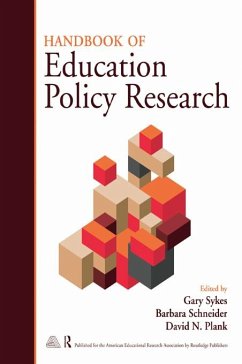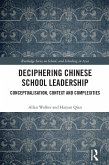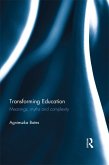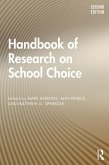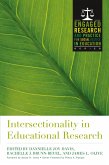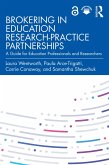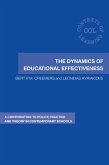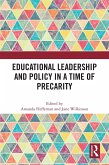Handbook of Education Policy Research (eBook, PDF)
Redaktion: Sykes, Gary; Plank, David N.; Schneider, Barbara
137,95 €
137,95 €
inkl. MwSt.
Sofort per Download lieferbar

69 °P sammeln
137,95 €
Als Download kaufen

137,95 €
inkl. MwSt.
Sofort per Download lieferbar

69 °P sammeln
Jetzt verschenken
Alle Infos zum eBook verschenken
137,95 €
inkl. MwSt.
Sofort per Download lieferbar
Alle Infos zum eBook verschenken

69 °P sammeln
Handbook of Education Policy Research (eBook, PDF)
Redaktion: Sykes, Gary; Plank, David N.; Schneider, Barbara
- Format: PDF
- Merkliste
- Auf die Merkliste
- Bewerten Bewerten
- Teilen
- Produkt teilen
- Produkterinnerung
- Produkterinnerung

Bitte loggen Sie sich zunächst in Ihr Kundenkonto ein oder registrieren Sie sich bei
bücher.de, um das eBook-Abo tolino select nutzen zu können.
Hier können Sie sich einloggen
Hier können Sie sich einloggen
Sie sind bereits eingeloggt. Klicken Sie auf 2. tolino select Abo, um fortzufahren.

Bitte loggen Sie sich zunächst in Ihr Kundenkonto ein oder registrieren Sie sich bei bücher.de, um das eBook-Abo tolino select nutzen zu können.
Educational policy continues to be of major concern. Defining the theoretical boundaries and methodological approaches of education policy research are the two primary themes of this comprehensive, AERA-sponsored Handbook .
- Geräte: PC
- mit Kopierschutz
- eBook Hilfe
- Größe: 9.98MB
Andere Kunden interessierten sich auch für
![Deciphering Chinese School Leadership (eBook, PDF) Deciphering Chinese School Leadership (eBook, PDF)]() Allan WalkerDeciphering Chinese School Leadership (eBook, PDF)43,95 €
Allan WalkerDeciphering Chinese School Leadership (eBook, PDF)43,95 €![Transforming Education (eBook, PDF) Transforming Education (eBook, PDF)]() Agnieszka BatesTransforming Education (eBook, PDF)41,95 €
Agnieszka BatesTransforming Education (eBook, PDF)41,95 €![Handbook of Research on School Choice (eBook, PDF) Handbook of Research on School Choice (eBook, PDF)]() Handbook of Research on School Choice (eBook, PDF)115,95 €
Handbook of Research on School Choice (eBook, PDF)115,95 €![Intersectionality in Educational Research (eBook, PDF) Intersectionality in Educational Research (eBook, PDF)]() Intersectionality in Educational Research (eBook, PDF)34,95 €
Intersectionality in Educational Research (eBook, PDF)34,95 €![Brokering in Education Research-Practice Partnerships (eBook, PDF) Brokering in Education Research-Practice Partnerships (eBook, PDF)]() Laura WentworthBrokering in Education Research-Practice Partnerships (eBook, PDF)0,00 €
Laura WentworthBrokering in Education Research-Practice Partnerships (eBook, PDF)0,00 €![The Dynamics of Educational Effectiveness (eBook, PDF) The Dynamics of Educational Effectiveness (eBook, PDF)]() Bert CreemersThe Dynamics of Educational Effectiveness (eBook, PDF)39,95 €
Bert CreemersThe Dynamics of Educational Effectiveness (eBook, PDF)39,95 €![Educational Leadership and Policy in a Time of Precarity (eBook, PDF) Educational Leadership and Policy in a Time of Precarity (eBook, PDF)]() Educational Leadership and Policy in a Time of Precarity (eBook, PDF)40,95 €
Educational Leadership and Policy in a Time of Precarity (eBook, PDF)40,95 €-
-
-
Educational policy continues to be of major concern. Defining the theoretical boundaries and methodological approaches of education policy research are the two primary themes of this comprehensive, AERA-sponsored Handbook.
Dieser Download kann aus rechtlichen Gründen nur mit Rechnungsadresse in A, B, BG, CY, CZ, D, DK, EW, E, FIN, F, GR, HR, H, IRL, I, LT, L, LR, M, NL, PL, P, R, S, SLO, SK ausgeliefert werden.
Produktdetails
- Produktdetails
- Verlag: Taylor & Francis eBooks
- Seitenzahl: 1064
- Erscheinungstermin: 10. September 2012
- Englisch
- ISBN-13: 9781135856472
- Artikelnr.: 38259070
- Verlag: Taylor & Francis eBooks
- Seitenzahl: 1064
- Erscheinungstermin: 10. September 2012
- Englisch
- ISBN-13: 9781135856472
- Artikelnr.: 38259070
- Herstellerkennzeichnung Die Herstellerinformationen sind derzeit nicht verfügbar.
Foreword Acknowledgments Introduction
Gary Sykes
Barbara Schneider
and Timothy G. Ford Section I: Social Science Disciplines and Education Policy Research Section Editors: Barbara Schneider and David N. Plank 1. Historians and Educational Policy Research in the United States
Maris A. Vinovskis 2. Policy Research in Education: The Economic View
Martin Carnoy 3. The Economic Value of Education and Cognitive Skills
Eric A. Hanushek 4. A Political Science Perspective on Education Policy Analysis
Lorraine M. McDonnell 5. Perspectives from the Disciplines: Sociological Contributions to Education Policy Research and Debates
Douglas Lee Lauen and Karolyn Tyson 6. Current Approaches to Research in Anthropology and Education
Maressa L. Dixon
Kathryn M. Borman
and Bridget A. Cotner 7. Making Education Research More Policy-Analytic
David L. Weimer 8. Commentary: Disciplined Education Policy Research
Michael J. Feuer 9. Commentary: The Disciplinary Foundations of Education Policy Research
Adam Gamoran Section II: Conducting Policy Research: Methodological Perspectives Section Editors: Barbara Schneider and David N. Plank 10. Separate Orbits: The Distinctive Worlds of Educational Research and Policymaking
Martin Orland 11. The Use of Randomized Trials to Inform Education Policy
Geoffrey D. Borman 12. Causal Inference in Non-Experimental Educational Policy Research
David Kaplan 13. Research Synthesis and Education Policy
Therese D. Pigott 14. Complementary Methods for Policy Research
Laura M. Desimone 15. Assessment Policy: Making Sense of the Babel
Joan L. Herman and Eva L. Baker 16. Scale-Up as a Framework for Intervention
Program
and Policy Evaluation Research
Sarah-Kathryn McDonald 17. Commentary: Conducting Policy Research: Methodological Perspectives
Spyros Konstantopoulos 18. Commentary: An Applied Perspective on Research
Method
and Policy
Christopher B. Swanson Section III: Politics and the Policy Process Section Editor: Jane Clark Lindle 19. Education and Domination: Reforming Policy and Practice through Critical Theory
Carlos Alberto Torres and Richard Van Heertum 20. Race
Ethnicity
and Education
Roslyn Arlin Mickelson 21. Race(ing)
Class(ing)
and Gender(ing) Our Work: Critical Race Theory
Critical Race Feminism
Epistemology
and New Directions in Educational Policy Research
David O. Stovall 22. Rhetoric and Symbolic Action in the Policy Process
Lisa Rosen 23. The Role of Law in Educational Policy Formation
Implementation
and Research
Julie F. Mead 24. Teacher Collective Bargaining: What We Know and What We Need to Know
Julia E. Koppich and Mary Alice Callahan 25. The Voice of the People in Education Policy
Rebecca Jacobsen 26. Assessment Policy and Politics of Information
Jane Clark Lindle 27. What Works in Defining "What Works" in Educational Improvement: Lessons from Education Policy Implementation Research
Directions for Future Research
Meredith I. Honig 28. Conceptualizing Policy Implementation: Large-Scale Reform in an Era of Complexity
Amanda Datnow and Vicki Park 29. Public Choice and the Political Economy of American Education
Martin West 30. Research in the Policy Process
Marshall S. Smith and Matthew L. Smith 31. Commentary: Politics and the Policy Process
Jane Hannaway 32. Commentary: Getting "Critically Real" About the State of Education Politics and Policy Process Research
V. Darleen Opfer Section IV: Policy Implications of Educational Resources
Management
and Organization Section Editor: Linda Skrla 33. Notes on Reframing the Role of the Organizations in Policy Implementation: Resources for Practice
in Practice
James P. Spillane
Louis M. Gomez
and Leigh Mesler 34. What Do We Know About Reducing Class and School Size? June Ahn and Dominic J. Brewer 35. Conceptions
Measurement and Application of Educational Adequacy and Equal Educational Opportunity
Bruce D. Baker and Preston C. Green
III 36. Whether and How Money Matters in K-12 Education
Margaret L. Plecki and Tino A. Castañeda 37. School Reconstitution and School Improvement: Theory and Evidence
Betty Malen and Jennifer King Rice 38. Charter School Policy Issues and Research Questions
Sandra Vergari 39. Vouchers
John F. Witte 40. A Market for Knowledge? Frederick M. Hess 41. Market Reforms in Education
Clive R. Belfield and Henry M. Levin 42. Commentary: A Call to Studied Action: Lessons from Research on Policies Designed to Improve the Organization and Management of Schooling
Steve Cantrell 43. Commentary: Improvement or Reinvention: Two Policy Approaches to School Reform
Rodney T. Ogawa Section V: Teaching and Learning Policy Section Editor: Gary Sykes 44. Opportunity to Learn
William H. Schmidt and Adam Maier 45. The Reading and Math Wars
Alan H. Schoenfeld and P. David Pearson 46. Language Policy in Education
Patricia Gándara and M. Cecilia Gómez 47. Teacher Quality and Teacher Labor Markets
Tara Béteille and Susanna Loeb 48. Teacher Preparation and Teacher Learning: A Changing Policy Landscape
Linda Darling-Hammond
Ruth Chung Wei
with Christy Marie Johnson 49. School Improvement by Design: Lessons from a Study of Comprehensive School Reform Programs
Brian P. Rowan
Richard J. Correnti
Robert J. Miller
and Eric M. Camburn 50. Measurement and Improvement of Teacher-Child Interactions: Implications for Policy and Accountability Frameworks of Standardized Observation
Robert C. Pianta and Bridget K. Hamre 51. Closing Achievement Gaps
George Farkas 52. New Technology
Yong Zhao and Jing Lei 53. Education and the Shrinking State
David N. Plank and Venessa Keesler 54. Commentary: Research on Teaching and Learning
Barbara R. Foorman 55. Commentary: Informing Teaching and Learning Policy
Robert E. Floden Section VI: Actors and Institutions in the Policy Process Section Editor: Carolyn Herrington 56. International and Transnational Policy Actors in Education: A Review of the Research
Karen Mundy with Mona Ghali 57. New Approaches to Understanding Federal Involvement in Education
Lora Cohen-Vogel and Michael K. McLendon 58. The Expansion of State Policy Research
Kathryn A. McDermott 59. The District Role in Instructional Improvement
Gary Sykes
Jennifer O'Day
and Timothy G. Ford 60. Pushing on the Paradigm: Research on Teachers' Organizations as Policy Actors
Nina Bascia 61. Local Democracy in Education
Michael Mintrom 62. The Politics of (Im)Prudent State-Level Homeschooling Policies
Catherine A. Lugg and Andrea K. Rorrer 63. Student Voice and Student Roles in Education Policy and Policy Reform
Dana L. Mitra 64. Looking Forward: Toward a New Role in Promoting Educational Equity for Students with Disabilities from Low-Income Backgrounds
Thomas Hehir 65. Commentary: Research on Actors and Institutions Involved in Education Policy: Themes
Tensions
and Topics to Explore
Martha McCarthy 66. Commentary: Nested Actors and Institutions: The Need for Better Theory
Data and Methods to Inform Education Policy
Mark Berends Section VII: Educational Access and Differentiation Section Editor: Barbara Schneider 67. Policy and Place-Learning from Decentralized Reforms
Bruce Fuller 68. Early Childhood Education
Lawrence J. Schweinhart and Rachel Fulcher-Dawson 69. Social Stratification and Educational Opportunity
Nathan D. Jones and Barbara Schneider 70. Shadow Education Systems
Chong-Jae Lee
Hyun-Jeong Park
and Heesook Lee 71. K-16 Transitions and Higher Education Access
Frankie Keels Williams 72. Permeability and Transparency in the High School-College Transition
Jennifer L. Stephan and James E. Rosenbaum 73. Governmental Policy and the Organization of Postsecondary Education
James C. Hearn and T. Austin Lacy 74. The Invisible Hand of World Education Culture: Thoughts for Policy Makers
David P. Baker 75. Commentary: Access and Differentiation
C. Kent McGuire 76. Commentary: Access and Differentiation: Structuring Equality and Inequality in Education Policy
Jeannie Oakes
Gary Sykes
Barbara Schneider
and Timothy G. Ford Section I: Social Science Disciplines and Education Policy Research Section Editors: Barbara Schneider and David N. Plank 1. Historians and Educational Policy Research in the United States
Maris A. Vinovskis 2. Policy Research in Education: The Economic View
Martin Carnoy 3. The Economic Value of Education and Cognitive Skills
Eric A. Hanushek 4. A Political Science Perspective on Education Policy Analysis
Lorraine M. McDonnell 5. Perspectives from the Disciplines: Sociological Contributions to Education Policy Research and Debates
Douglas Lee Lauen and Karolyn Tyson 6. Current Approaches to Research in Anthropology and Education
Maressa L. Dixon
Kathryn M. Borman
and Bridget A. Cotner 7. Making Education Research More Policy-Analytic
David L. Weimer 8. Commentary: Disciplined Education Policy Research
Michael J. Feuer 9. Commentary: The Disciplinary Foundations of Education Policy Research
Adam Gamoran Section II: Conducting Policy Research: Methodological Perspectives Section Editors: Barbara Schneider and David N. Plank 10. Separate Orbits: The Distinctive Worlds of Educational Research and Policymaking
Martin Orland 11. The Use of Randomized Trials to Inform Education Policy
Geoffrey D. Borman 12. Causal Inference in Non-Experimental Educational Policy Research
David Kaplan 13. Research Synthesis and Education Policy
Therese D. Pigott 14. Complementary Methods for Policy Research
Laura M. Desimone 15. Assessment Policy: Making Sense of the Babel
Joan L. Herman and Eva L. Baker 16. Scale-Up as a Framework for Intervention
Program
and Policy Evaluation Research
Sarah-Kathryn McDonald 17. Commentary: Conducting Policy Research: Methodological Perspectives
Spyros Konstantopoulos 18. Commentary: An Applied Perspective on Research
Method
and Policy
Christopher B. Swanson Section III: Politics and the Policy Process Section Editor: Jane Clark Lindle 19. Education and Domination: Reforming Policy and Practice through Critical Theory
Carlos Alberto Torres and Richard Van Heertum 20. Race
Ethnicity
and Education
Roslyn Arlin Mickelson 21. Race(ing)
Class(ing)
and Gender(ing) Our Work: Critical Race Theory
Critical Race Feminism
Epistemology
and New Directions in Educational Policy Research
David O. Stovall 22. Rhetoric and Symbolic Action in the Policy Process
Lisa Rosen 23. The Role of Law in Educational Policy Formation
Implementation
and Research
Julie F. Mead 24. Teacher Collective Bargaining: What We Know and What We Need to Know
Julia E. Koppich and Mary Alice Callahan 25. The Voice of the People in Education Policy
Rebecca Jacobsen 26. Assessment Policy and Politics of Information
Jane Clark Lindle 27. What Works in Defining "What Works" in Educational Improvement: Lessons from Education Policy Implementation Research
Directions for Future Research
Meredith I. Honig 28. Conceptualizing Policy Implementation: Large-Scale Reform in an Era of Complexity
Amanda Datnow and Vicki Park 29. Public Choice and the Political Economy of American Education
Martin West 30. Research in the Policy Process
Marshall S. Smith and Matthew L. Smith 31. Commentary: Politics and the Policy Process
Jane Hannaway 32. Commentary: Getting "Critically Real" About the State of Education Politics and Policy Process Research
V. Darleen Opfer Section IV: Policy Implications of Educational Resources
Management
and Organization Section Editor: Linda Skrla 33. Notes on Reframing the Role of the Organizations in Policy Implementation: Resources for Practice
in Practice
James P. Spillane
Louis M. Gomez
and Leigh Mesler 34. What Do We Know About Reducing Class and School Size? June Ahn and Dominic J. Brewer 35. Conceptions
Measurement and Application of Educational Adequacy and Equal Educational Opportunity
Bruce D. Baker and Preston C. Green
III 36. Whether and How Money Matters in K-12 Education
Margaret L. Plecki and Tino A. Castañeda 37. School Reconstitution and School Improvement: Theory and Evidence
Betty Malen and Jennifer King Rice 38. Charter School Policy Issues and Research Questions
Sandra Vergari 39. Vouchers
John F. Witte 40. A Market for Knowledge? Frederick M. Hess 41. Market Reforms in Education
Clive R. Belfield and Henry M. Levin 42. Commentary: A Call to Studied Action: Lessons from Research on Policies Designed to Improve the Organization and Management of Schooling
Steve Cantrell 43. Commentary: Improvement or Reinvention: Two Policy Approaches to School Reform
Rodney T. Ogawa Section V: Teaching and Learning Policy Section Editor: Gary Sykes 44. Opportunity to Learn
William H. Schmidt and Adam Maier 45. The Reading and Math Wars
Alan H. Schoenfeld and P. David Pearson 46. Language Policy in Education
Patricia Gándara and M. Cecilia Gómez 47. Teacher Quality and Teacher Labor Markets
Tara Béteille and Susanna Loeb 48. Teacher Preparation and Teacher Learning: A Changing Policy Landscape
Linda Darling-Hammond
Ruth Chung Wei
with Christy Marie Johnson 49. School Improvement by Design: Lessons from a Study of Comprehensive School Reform Programs
Brian P. Rowan
Richard J. Correnti
Robert J. Miller
and Eric M. Camburn 50. Measurement and Improvement of Teacher-Child Interactions: Implications for Policy and Accountability Frameworks of Standardized Observation
Robert C. Pianta and Bridget K. Hamre 51. Closing Achievement Gaps
George Farkas 52. New Technology
Yong Zhao and Jing Lei 53. Education and the Shrinking State
David N. Plank and Venessa Keesler 54. Commentary: Research on Teaching and Learning
Barbara R. Foorman 55. Commentary: Informing Teaching and Learning Policy
Robert E. Floden Section VI: Actors and Institutions in the Policy Process Section Editor: Carolyn Herrington 56. International and Transnational Policy Actors in Education: A Review of the Research
Karen Mundy with Mona Ghali 57. New Approaches to Understanding Federal Involvement in Education
Lora Cohen-Vogel and Michael K. McLendon 58. The Expansion of State Policy Research
Kathryn A. McDermott 59. The District Role in Instructional Improvement
Gary Sykes
Jennifer O'Day
and Timothy G. Ford 60. Pushing on the Paradigm: Research on Teachers' Organizations as Policy Actors
Nina Bascia 61. Local Democracy in Education
Michael Mintrom 62. The Politics of (Im)Prudent State-Level Homeschooling Policies
Catherine A. Lugg and Andrea K. Rorrer 63. Student Voice and Student Roles in Education Policy and Policy Reform
Dana L. Mitra 64. Looking Forward: Toward a New Role in Promoting Educational Equity for Students with Disabilities from Low-Income Backgrounds
Thomas Hehir 65. Commentary: Research on Actors and Institutions Involved in Education Policy: Themes
Tensions
and Topics to Explore
Martha McCarthy 66. Commentary: Nested Actors and Institutions: The Need for Better Theory
Data and Methods to Inform Education Policy
Mark Berends Section VII: Educational Access and Differentiation Section Editor: Barbara Schneider 67. Policy and Place-Learning from Decentralized Reforms
Bruce Fuller 68. Early Childhood Education
Lawrence J. Schweinhart and Rachel Fulcher-Dawson 69. Social Stratification and Educational Opportunity
Nathan D. Jones and Barbara Schneider 70. Shadow Education Systems
Chong-Jae Lee
Hyun-Jeong Park
and Heesook Lee 71. K-16 Transitions and Higher Education Access
Frankie Keels Williams 72. Permeability and Transparency in the High School-College Transition
Jennifer L. Stephan and James E. Rosenbaum 73. Governmental Policy and the Organization of Postsecondary Education
James C. Hearn and T. Austin Lacy 74. The Invisible Hand of World Education Culture: Thoughts for Policy Makers
David P. Baker 75. Commentary: Access and Differentiation
C. Kent McGuire 76. Commentary: Access and Differentiation: Structuring Equality and Inequality in Education Policy
Jeannie Oakes
Foreword Acknowledgments Introduction
Gary Sykes
Barbara Schneider
and Timothy G. Ford Section I: Social Science Disciplines and Education Policy Research Section Editors: Barbara Schneider and David N. Plank 1. Historians and Educational Policy Research in the United States
Maris A. Vinovskis 2. Policy Research in Education: The Economic View
Martin Carnoy 3. The Economic Value of Education and Cognitive Skills
Eric A. Hanushek 4. A Political Science Perspective on Education Policy Analysis
Lorraine M. McDonnell 5. Perspectives from the Disciplines: Sociological Contributions to Education Policy Research and Debates
Douglas Lee Lauen and Karolyn Tyson 6. Current Approaches to Research in Anthropology and Education
Maressa L. Dixon
Kathryn M. Borman
and Bridget A. Cotner 7. Making Education Research More Policy-Analytic
David L. Weimer 8. Commentary: Disciplined Education Policy Research
Michael J. Feuer 9. Commentary: The Disciplinary Foundations of Education Policy Research
Adam Gamoran Section II: Conducting Policy Research: Methodological Perspectives Section Editors: Barbara Schneider and David N. Plank 10. Separate Orbits: The Distinctive Worlds of Educational Research and Policymaking
Martin Orland 11. The Use of Randomized Trials to Inform Education Policy
Geoffrey D. Borman 12. Causal Inference in Non-Experimental Educational Policy Research
David Kaplan 13. Research Synthesis and Education Policy
Therese D. Pigott 14. Complementary Methods for Policy Research
Laura M. Desimone 15. Assessment Policy: Making Sense of the Babel
Joan L. Herman and Eva L. Baker 16. Scale-Up as a Framework for Intervention
Program
and Policy Evaluation Research
Sarah-Kathryn McDonald 17. Commentary: Conducting Policy Research: Methodological Perspectives
Spyros Konstantopoulos 18. Commentary: An Applied Perspective on Research
Method
and Policy
Christopher B. Swanson Section III: Politics and the Policy Process Section Editor: Jane Clark Lindle 19. Education and Domination: Reforming Policy and Practice through Critical Theory
Carlos Alberto Torres and Richard Van Heertum 20. Race
Ethnicity
and Education
Roslyn Arlin Mickelson 21. Race(ing)
Class(ing)
and Gender(ing) Our Work: Critical Race Theory
Critical Race Feminism
Epistemology
and New Directions in Educational Policy Research
David O. Stovall 22. Rhetoric and Symbolic Action in the Policy Process
Lisa Rosen 23. The Role of Law in Educational Policy Formation
Implementation
and Research
Julie F. Mead 24. Teacher Collective Bargaining: What We Know and What We Need to Know
Julia E. Koppich and Mary Alice Callahan 25. The Voice of the People in Education Policy
Rebecca Jacobsen 26. Assessment Policy and Politics of Information
Jane Clark Lindle 27. What Works in Defining "What Works" in Educational Improvement: Lessons from Education Policy Implementation Research
Directions for Future Research
Meredith I. Honig 28. Conceptualizing Policy Implementation: Large-Scale Reform in an Era of Complexity
Amanda Datnow and Vicki Park 29. Public Choice and the Political Economy of American Education
Martin West 30. Research in the Policy Process
Marshall S. Smith and Matthew L. Smith 31. Commentary: Politics and the Policy Process
Jane Hannaway 32. Commentary: Getting "Critically Real" About the State of Education Politics and Policy Process Research
V. Darleen Opfer Section IV: Policy Implications of Educational Resources
Management
and Organization Section Editor: Linda Skrla 33. Notes on Reframing the Role of the Organizations in Policy Implementation: Resources for Practice
in Practice
James P. Spillane
Louis M. Gomez
and Leigh Mesler 34. What Do We Know About Reducing Class and School Size? June Ahn and Dominic J. Brewer 35. Conceptions
Measurement and Application of Educational Adequacy and Equal Educational Opportunity
Bruce D. Baker and Preston C. Green
III 36. Whether and How Money Matters in K-12 Education
Margaret L. Plecki and Tino A. Castañeda 37. School Reconstitution and School Improvement: Theory and Evidence
Betty Malen and Jennifer King Rice 38. Charter School Policy Issues and Research Questions
Sandra Vergari 39. Vouchers
John F. Witte 40. A Market for Knowledge? Frederick M. Hess 41. Market Reforms in Education
Clive R. Belfield and Henry M. Levin 42. Commentary: A Call to Studied Action: Lessons from Research on Policies Designed to Improve the Organization and Management of Schooling
Steve Cantrell 43. Commentary: Improvement or Reinvention: Two Policy Approaches to School Reform
Rodney T. Ogawa Section V: Teaching and Learning Policy Section Editor: Gary Sykes 44. Opportunity to Learn
William H. Schmidt and Adam Maier 45. The Reading and Math Wars
Alan H. Schoenfeld and P. David Pearson 46. Language Policy in Education
Patricia Gándara and M. Cecilia Gómez 47. Teacher Quality and Teacher Labor Markets
Tara Béteille and Susanna Loeb 48. Teacher Preparation and Teacher Learning: A Changing Policy Landscape
Linda Darling-Hammond
Ruth Chung Wei
with Christy Marie Johnson 49. School Improvement by Design: Lessons from a Study of Comprehensive School Reform Programs
Brian P. Rowan
Richard J. Correnti
Robert J. Miller
and Eric M. Camburn 50. Measurement and Improvement of Teacher-Child Interactions: Implications for Policy and Accountability Frameworks of Standardized Observation
Robert C. Pianta and Bridget K. Hamre 51. Closing Achievement Gaps
George Farkas 52. New Technology
Yong Zhao and Jing Lei 53. Education and the Shrinking State
David N. Plank and Venessa Keesler 54. Commentary: Research on Teaching and Learning
Barbara R. Foorman 55. Commentary: Informing Teaching and Learning Policy
Robert E. Floden Section VI: Actors and Institutions in the Policy Process Section Editor: Carolyn Herrington 56. International and Transnational Policy Actors in Education: A Review of the Research
Karen Mundy with Mona Ghali 57. New Approaches to Understanding Federal Involvement in Education
Lora Cohen-Vogel and Michael K. McLendon 58. The Expansion of State Policy Research
Kathryn A. McDermott 59. The District Role in Instructional Improvement
Gary Sykes
Jennifer O'Day
and Timothy G. Ford 60. Pushing on the Paradigm: Research on Teachers' Organizations as Policy Actors
Nina Bascia 61. Local Democracy in Education
Michael Mintrom 62. The Politics of (Im)Prudent State-Level Homeschooling Policies
Catherine A. Lugg and Andrea K. Rorrer 63. Student Voice and Student Roles in Education Policy and Policy Reform
Dana L. Mitra 64. Looking Forward: Toward a New Role in Promoting Educational Equity for Students with Disabilities from Low-Income Backgrounds
Thomas Hehir 65. Commentary: Research on Actors and Institutions Involved in Education Policy: Themes
Tensions
and Topics to Explore
Martha McCarthy 66. Commentary: Nested Actors and Institutions: The Need for Better Theory
Data and Methods to Inform Education Policy
Mark Berends Section VII: Educational Access and Differentiation Section Editor: Barbara Schneider 67. Policy and Place-Learning from Decentralized Reforms
Bruce Fuller 68. Early Childhood Education
Lawrence J. Schweinhart and Rachel Fulcher-Dawson 69. Social Stratification and Educational Opportunity
Nathan D. Jones and Barbara Schneider 70. Shadow Education Systems
Chong-Jae Lee
Hyun-Jeong Park
and Heesook Lee 71. K-16 Transitions and Higher Education Access
Frankie Keels Williams 72. Permeability and Transparency in the High School-College Transition
Jennifer L. Stephan and James E. Rosenbaum 73. Governmental Policy and the Organization of Postsecondary Education
James C. Hearn and T. Austin Lacy 74. The Invisible Hand of World Education Culture: Thoughts for Policy Makers
David P. Baker 75. Commentary: Access and Differentiation
C. Kent McGuire 76. Commentary: Access and Differentiation: Structuring Equality and Inequality in Education Policy
Jeannie Oakes
Gary Sykes
Barbara Schneider
and Timothy G. Ford Section I: Social Science Disciplines and Education Policy Research Section Editors: Barbara Schneider and David N. Plank 1. Historians and Educational Policy Research in the United States
Maris A. Vinovskis 2. Policy Research in Education: The Economic View
Martin Carnoy 3. The Economic Value of Education and Cognitive Skills
Eric A. Hanushek 4. A Political Science Perspective on Education Policy Analysis
Lorraine M. McDonnell 5. Perspectives from the Disciplines: Sociological Contributions to Education Policy Research and Debates
Douglas Lee Lauen and Karolyn Tyson 6. Current Approaches to Research in Anthropology and Education
Maressa L. Dixon
Kathryn M. Borman
and Bridget A. Cotner 7. Making Education Research More Policy-Analytic
David L. Weimer 8. Commentary: Disciplined Education Policy Research
Michael J. Feuer 9. Commentary: The Disciplinary Foundations of Education Policy Research
Adam Gamoran Section II: Conducting Policy Research: Methodological Perspectives Section Editors: Barbara Schneider and David N. Plank 10. Separate Orbits: The Distinctive Worlds of Educational Research and Policymaking
Martin Orland 11. The Use of Randomized Trials to Inform Education Policy
Geoffrey D. Borman 12. Causal Inference in Non-Experimental Educational Policy Research
David Kaplan 13. Research Synthesis and Education Policy
Therese D. Pigott 14. Complementary Methods for Policy Research
Laura M. Desimone 15. Assessment Policy: Making Sense of the Babel
Joan L. Herman and Eva L. Baker 16. Scale-Up as a Framework for Intervention
Program
and Policy Evaluation Research
Sarah-Kathryn McDonald 17. Commentary: Conducting Policy Research: Methodological Perspectives
Spyros Konstantopoulos 18. Commentary: An Applied Perspective on Research
Method
and Policy
Christopher B. Swanson Section III: Politics and the Policy Process Section Editor: Jane Clark Lindle 19. Education and Domination: Reforming Policy and Practice through Critical Theory
Carlos Alberto Torres and Richard Van Heertum 20. Race
Ethnicity
and Education
Roslyn Arlin Mickelson 21. Race(ing)
Class(ing)
and Gender(ing) Our Work: Critical Race Theory
Critical Race Feminism
Epistemology
and New Directions in Educational Policy Research
David O. Stovall 22. Rhetoric and Symbolic Action in the Policy Process
Lisa Rosen 23. The Role of Law in Educational Policy Formation
Implementation
and Research
Julie F. Mead 24. Teacher Collective Bargaining: What We Know and What We Need to Know
Julia E. Koppich and Mary Alice Callahan 25. The Voice of the People in Education Policy
Rebecca Jacobsen 26. Assessment Policy and Politics of Information
Jane Clark Lindle 27. What Works in Defining "What Works" in Educational Improvement: Lessons from Education Policy Implementation Research
Directions for Future Research
Meredith I. Honig 28. Conceptualizing Policy Implementation: Large-Scale Reform in an Era of Complexity
Amanda Datnow and Vicki Park 29. Public Choice and the Political Economy of American Education
Martin West 30. Research in the Policy Process
Marshall S. Smith and Matthew L. Smith 31. Commentary: Politics and the Policy Process
Jane Hannaway 32. Commentary: Getting "Critically Real" About the State of Education Politics and Policy Process Research
V. Darleen Opfer Section IV: Policy Implications of Educational Resources
Management
and Organization Section Editor: Linda Skrla 33. Notes on Reframing the Role of the Organizations in Policy Implementation: Resources for Practice
in Practice
James P. Spillane
Louis M. Gomez
and Leigh Mesler 34. What Do We Know About Reducing Class and School Size? June Ahn and Dominic J. Brewer 35. Conceptions
Measurement and Application of Educational Adequacy and Equal Educational Opportunity
Bruce D. Baker and Preston C. Green
III 36. Whether and How Money Matters in K-12 Education
Margaret L. Plecki and Tino A. Castañeda 37. School Reconstitution and School Improvement: Theory and Evidence
Betty Malen and Jennifer King Rice 38. Charter School Policy Issues and Research Questions
Sandra Vergari 39. Vouchers
John F. Witte 40. A Market for Knowledge? Frederick M. Hess 41. Market Reforms in Education
Clive R. Belfield and Henry M. Levin 42. Commentary: A Call to Studied Action: Lessons from Research on Policies Designed to Improve the Organization and Management of Schooling
Steve Cantrell 43. Commentary: Improvement or Reinvention: Two Policy Approaches to School Reform
Rodney T. Ogawa Section V: Teaching and Learning Policy Section Editor: Gary Sykes 44. Opportunity to Learn
William H. Schmidt and Adam Maier 45. The Reading and Math Wars
Alan H. Schoenfeld and P. David Pearson 46. Language Policy in Education
Patricia Gándara and M. Cecilia Gómez 47. Teacher Quality and Teacher Labor Markets
Tara Béteille and Susanna Loeb 48. Teacher Preparation and Teacher Learning: A Changing Policy Landscape
Linda Darling-Hammond
Ruth Chung Wei
with Christy Marie Johnson 49. School Improvement by Design: Lessons from a Study of Comprehensive School Reform Programs
Brian P. Rowan
Richard J. Correnti
Robert J. Miller
and Eric M. Camburn 50. Measurement and Improvement of Teacher-Child Interactions: Implications for Policy and Accountability Frameworks of Standardized Observation
Robert C. Pianta and Bridget K. Hamre 51. Closing Achievement Gaps
George Farkas 52. New Technology
Yong Zhao and Jing Lei 53. Education and the Shrinking State
David N. Plank and Venessa Keesler 54. Commentary: Research on Teaching and Learning
Barbara R. Foorman 55. Commentary: Informing Teaching and Learning Policy
Robert E. Floden Section VI: Actors and Institutions in the Policy Process Section Editor: Carolyn Herrington 56. International and Transnational Policy Actors in Education: A Review of the Research
Karen Mundy with Mona Ghali 57. New Approaches to Understanding Federal Involvement in Education
Lora Cohen-Vogel and Michael K. McLendon 58. The Expansion of State Policy Research
Kathryn A. McDermott 59. The District Role in Instructional Improvement
Gary Sykes
Jennifer O'Day
and Timothy G. Ford 60. Pushing on the Paradigm: Research on Teachers' Organizations as Policy Actors
Nina Bascia 61. Local Democracy in Education
Michael Mintrom 62. The Politics of (Im)Prudent State-Level Homeschooling Policies
Catherine A. Lugg and Andrea K. Rorrer 63. Student Voice and Student Roles in Education Policy and Policy Reform
Dana L. Mitra 64. Looking Forward: Toward a New Role in Promoting Educational Equity for Students with Disabilities from Low-Income Backgrounds
Thomas Hehir 65. Commentary: Research on Actors and Institutions Involved in Education Policy: Themes
Tensions
and Topics to Explore
Martha McCarthy 66. Commentary: Nested Actors and Institutions: The Need for Better Theory
Data and Methods to Inform Education Policy
Mark Berends Section VII: Educational Access and Differentiation Section Editor: Barbara Schneider 67. Policy and Place-Learning from Decentralized Reforms
Bruce Fuller 68. Early Childhood Education
Lawrence J. Schweinhart and Rachel Fulcher-Dawson 69. Social Stratification and Educational Opportunity
Nathan D. Jones and Barbara Schneider 70. Shadow Education Systems
Chong-Jae Lee
Hyun-Jeong Park
and Heesook Lee 71. K-16 Transitions and Higher Education Access
Frankie Keels Williams 72. Permeability and Transparency in the High School-College Transition
Jennifer L. Stephan and James E. Rosenbaum 73. Governmental Policy and the Organization of Postsecondary Education
James C. Hearn and T. Austin Lacy 74. The Invisible Hand of World Education Culture: Thoughts for Policy Makers
David P. Baker 75. Commentary: Access and Differentiation
C. Kent McGuire 76. Commentary: Access and Differentiation: Structuring Equality and Inequality in Education Policy
Jeannie Oakes
